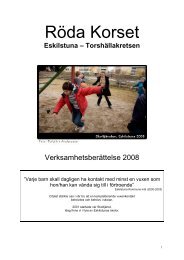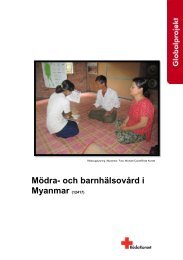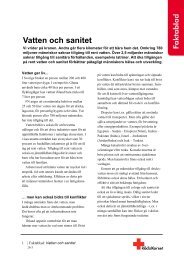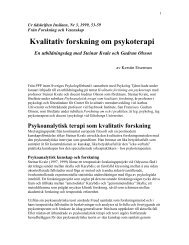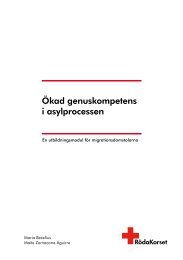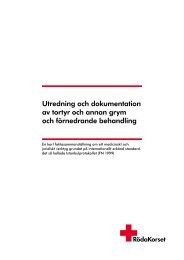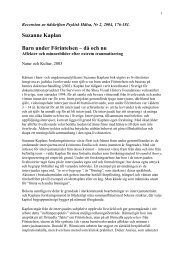- Page 1 and 2:
Strictly under embargo untilWednesd
- Page 4 and 5:
A global humanitarian organizationT
- Page 6 and 7:
Strictly under embargo until Wednes
- Page 8:
Strictly under embargo until Wednes
- Page 12:
Strictly under embargo until Wednes
- Page 17 and 18:
Strictly under embargo until Wednes
- Page 19 and 20:
Strictly under embargo until Wednes
- Page 21 and 22:
Strictly under embargo until Wednes
- Page 23 and 24:
Strictly under embargo until Wednes
- Page 25 and 26:
Strictly under embargo until Wednes
- Page 27 and 28:
Strictly under embargo until Wednes
- Page 29 and 30:
Strictly under embargo until Wednes
- Page 31 and 32:
Strictly under embargo until Wednes
- Page 33 and 34:
Strictly under embargo until Wednes
- Page 35 and 36:
Strictly under embargo until Wednes
- Page 37 and 38:
Strictly under embargo until Wednes
- Page 39 and 40:
Strictly under embargo until Wednes
- Page 41 and 42:
Strictly under embargo until Wednes
- Page 43 and 44:
Strictly under embargo until Wednes
- Page 45 and 46:
Strictly under embargo until Wednes
- Page 47 and 48:
Strictly under embargo until Wednes
- Page 49 and 50:
Strictly under embargo until Wednes
- Page 51 and 52:
Strictly under embargo until Wednes
- Page 53 and 54:
Strictly under embargo until Wednes
- Page 55 and 56:
Strictly under embargo until Wednes
- Page 57 and 58:
Strictly under embargo until Wednes
- Page 59 and 60:
Strictly under embargo until Wednes
- Page 61 and 62:
Strictly under embargo until Wednes
- Page 63 and 64:
Strictly under embargo until Wednes
- Page 65 and 66:
Strictly under embargo until Wednes
- Page 67 and 68:
Strictly under embargo until Wednes
- Page 69 and 70:
Strictly under embargo until Wednes
- Page 71 and 72:
Strictly under embargo until Wednes
- Page 73 and 74:
Strictly under embargo until Wednes
- Page 75 and 76:
Strictly under embargo until Wednes
- Page 77 and 78:
Strictly under embargo until Wednes
- Page 79 and 80:
Strictly under embargo until Wednes
- Page 81 and 82:
Strictly under embargo until Wednes
- Page 83 and 84:
Strictly under embargo until Wednes
- Page 85 and 86:
Strictly under embargo until Wednes
- Page 87 and 88:
Strictly under embargo until Wednes
- Page 89 and 90:
Strictly under embargo until Wednes
- Page 91 and 92:
Strictly under embargo until Wednes
- Page 93 and 94:
Strictly under embargo until Wednes
- Page 95 and 96:
Strictly under embargo until Wednes
- Page 97 and 98: Strictly under embargo until Wednes
- Page 99 and 100: Strictly under embargo until Wednes
- Page 101: Strictly under embargo until Wednes
- Page 106 and 107: Strictly under embargo until Wednes
- Page 108 and 109: Strictly under embargo until Wednes
- Page 110 and 111: Strictly under embargo until Wednes
- Page 112 and 113: Strictly under embargo until Wednes
- Page 114 and 115: Strictly under embargo until Wednes
- Page 116 and 117: Strictly under embargo until Wednes
- Page 118 and 119: 114CHAPTER 6Strictly under embargo
- Page 120 and 121: Strictly under embargo until Wednes
- Page 122 and 123: Strictly under embargo until Wednes
- Page 124 and 125: Strictly under embargo until Wednes
- Page 126 and 127: Strictly under embargo until Wednes
- Page 128 and 129: Strictly under embargo until Wednes
- Page 130 and 131: Strictly under embargo until Wednes
- Page 132 and 133: Strictly under embargo until Wednes
- Page 134 and 135: Strictly under embargo until Wednes
- Page 136 and 137: Strictly under embargo until Wednes
- Page 138 and 139: Strictly under embargo until Wednes
- Page 140 and 141: Strictly under embargo until Wednes
- Page 142 and 143: 138CHAPTER 7Strictly under embargo
- Page 144 and 145: Strictly under embargo until Wednes
- Page 146 and 147: Strictly under embargo until Wednes
- Page 150 and 151: Strictly under embargo until Wednes
- Page 152 and 153: Strictly under embargo until Wednes
- Page 154 and 155: Strictly under embargo until Wednes
- Page 156 and 157: Strictly under embargo until Wednes
- Page 158 and 159: Strictly under embargo until Wednes
- Page 160 and 161: Strictly under embargo until Wednes
- Page 162 and 163: Strictly under embargo until Wednes
- Page 164 and 165: Strictly under embargo until Wednes
- Page 166 and 167: Strictly under embargo until Wednes
- Page 168 and 169: Strictly under embargo until Wednes
- Page 170 and 171: Strictly under embargo until Wednes
- Page 172 and 173: Strictly under embargo until Wednes
- Page 174 and 175: Strictly under embargo until Wednes
- Page 176 and 177: Strictly under embargo until Wednes
- Page 178 and 179: Strictly under embargo until Wednes
- Page 180 and 181: Strictly under embargo until Wednes
- Page 182 and 183: Strictly under embargo until Wednes
- Page 184 and 185: Strictly under embargo until Wednes
- Page 186 and 187: Strictly under embargo until Wednes
- Page 188 and 189: Strictly under embargo until Wednes
- Page 190 and 191: Strictly under embargo until Wednes
- Page 192 and 193: Strictly under embargo until Wednes
- Page 194 and 195: 190ANNEX 2Strictly under embargo un
- Page 196 and 197: Strictly under embargo until Wednes
- Page 198 and 199:
Strictly under embargo until Wednes
- Page 200 and 201:
Strictly under embargo until Wednes
- Page 202 and 203:
Strictly under embargo until Wednes
- Page 204 and 205:
Strictly under embargo until Wednes
- Page 206 and 207:
Strictly under embargo until Wednes
- Page 208 and 209:
Strictly under embargo until Wednes
- Page 210 and 211:
Strictly under embargo until Wednes
- Page 212 and 213:
Strictly under embargo until Wednes
- Page 214 and 215:
Strictly under embargo until Wednes
- Page 216 and 217:
Strictly under embargo until Wednes
- Page 218 and 219:
214INDEXStrictly under embargo unti
- Page 220:
The International Federationof Red



